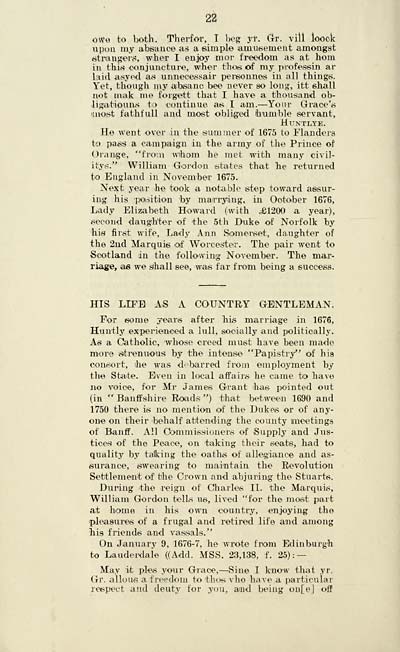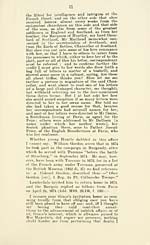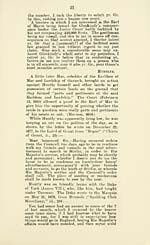1st Duke of Gordon
(26) Page 22
Download files
Complete book:
Individual page:
Thumbnail gallery: Grid view | List view

22
owe to both. Therfor, I beg yt. Gr. vill ioook
upon my absance as a simple amusement amongst
strangers, wher I enjoy mor freedom as at horn
in this conjuncture, wher thos of my professin ar
laid asyed as unnecessair personnes in all things.
Yet, though my absano bee never so long, itt shall
not mak me forgett that I have a thousand ob-
ligatiouns to continue as I am. — Your Grace's
anost fa th full and most obliged humble servant,
Huntlye.
He went over in the summer of 1675 to Flanders
to pass a campaign in the army of the Prince of
Orange, "from w>hom he met with many civil-
ity*." William Gordon states that he returned
to England in November 1675.
Next year he took a notable step toward assur-
ing his position by marrying, in Ootober 1676,
Lady Elizabeth Howard (with ,£1200 a year),
second daughter of the 5th Duke of Norfolk by
his first wife, Lady Ann Somerset, daughter of
the 2nd Marquis of Worcester. The pair went to
Scotland in the following November. The mar-
riage, as we shall see, was far from being a success.
HIS LIFE AS A COUNTRY GENTLEMAN.
For some years after his marriage in 1676,
Huntly experienced a lull, socially and politically.
As a Catholic, whose creed must have been made
more strenuous by the intense "Papistry" of his
consort, lie was debarred from employment by
the State. Even in local affairs he came to have
no voice, for Mr James Grant 'has pointed out
(in " Banffshire Roads ") that between 1690 and
1750 there is no mention of the Dukes or of any-
one on their behalf attending the county aneetings
of Banff. All Commissioners of Supply and Jus-
tices of the Peace, on taking their seats, had to
quality by talking the oaths of allegiance and as-
surance, swearing to maintain the Revolution
Settlement of the Crown and abjuring the Stuarts.
During the reign of Charles II. the Marquis,
William Gordon tells us, lived "for the most part
at home in his own country, enjoying the
pleasures of a frugal and retired life and among
his friends and vassals."
On January 9, 1676-7, he wrote from Edinburgh
to Lauderdale ((Add. MSS. 23,138, f. 25): —
May it pies your Grace, — Sine I know that yr,
Gr. allous a. freedom to th<>s vho have a particular
respect and deuty for you, amd being on[e| off
owe to both. Therfor, I beg yt. Gr. vill ioook
upon my absance as a simple amusement amongst
strangers, wher I enjoy mor freedom as at horn
in this conjuncture, wher thos of my professin ar
laid asyed as unnecessair personnes in all things.
Yet, though my absano bee never so long, itt shall
not mak me forgett that I have a thousand ob-
ligatiouns to continue as I am. — Your Grace's
anost fa th full and most obliged humble servant,
Huntlye.
He went over in the summer of 1675 to Flanders
to pass a campaign in the army of the Prince of
Orange, "from w>hom he met with many civil-
ity*." William Gordon states that he returned
to England in November 1675.
Next year he took a notable step toward assur-
ing his position by marrying, in Ootober 1676,
Lady Elizabeth Howard (with ,£1200 a year),
second daughter of the 5th Duke of Norfolk by
his first wife, Lady Ann Somerset, daughter of
the 2nd Marquis of Worcester. The pair went to
Scotland in the following November. The mar-
riage, as we shall see, was far from being a success.
HIS LIFE AS A COUNTRY GENTLEMAN.
For some years after his marriage in 1676,
Huntly experienced a lull, socially and politically.
As a Catholic, whose creed must have been made
more strenuous by the intense "Papistry" of his
consort, lie was debarred from employment by
the State. Even in local affairs he came to have
no voice, for Mr James Grant 'has pointed out
(in " Banffshire Roads ") that between 1690 and
1750 there is no mention of the Dukes or of any-
one on their behalf attending the county aneetings
of Banff. All Commissioners of Supply and Jus-
tices of the Peace, on taking their seats, had to
quality by talking the oaths of allegiance and as-
surance, swearing to maintain the Revolution
Settlement of the Crown and abjuring the Stuarts.
During the reign of Charles II. the Marquis,
William Gordon tells us, lived "for the most part
at home in his own country, enjoying the
pleasures of a frugal and retired life and among
his friends and vassals."
On January 9, 1676-7, he wrote from Edinburgh
to Lauderdale ((Add. MSS. 23,138, f. 25): —
May it pies your Grace, — Sine I know that yr,
Gr. allous a. freedom to th<>s vho have a particular
respect and deuty for you, amd being on[e| off
Set display mode to:
![]() Universal Viewer |
Universal Viewer | ![]() Mirador |
Large image | Transcription
Mirador |
Large image | Transcription
Images and transcriptions on this page, including medium image downloads, may be used under the Creative Commons Attribution 4.0 International Licence unless otherwise stated. ![]()
| Histories of Scottish families > 1st Duke of Gordon > (26) Page 22 |
|---|
| Permanent URL | https://digital.nls.uk/91797488 |
|---|
| Description | A selection of almost 400 printed items relating to the history of Scottish families, mostly dating from the 19th and early 20th centuries. Includes memoirs, genealogies and clan histories, with a few produced by emigrant families. The earliest family history goes back to AD 916. |
|---|

